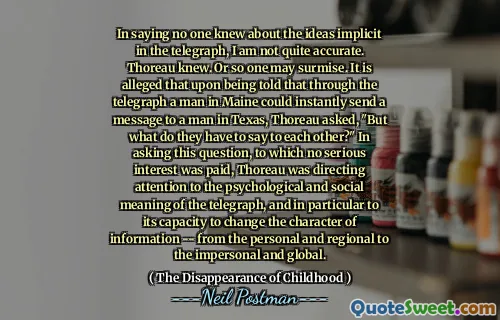The Disappearance of Childhood by Neil Postman examines how the concept of childhood has evolved and diminished in contemporary society. Postman argues that the distinction between childhood and adulthood has blurred significantly due to the pervasive influence of media and technology. Children are now exposed to adult themes and information much earlier, leading to a premature loss of innocence and the traditional boundaries that once defined childhood. Postman suggests that the rise of electronic media, particularly television, has played a pivotal role in this transformation. Unlike in previous generations, where literacy and printed material set clear age-related boundaries, visual media allows children to access complex and often inappropriate content. This shift has not only made children more akin to adults but has also changed how society perceives and treats children. Ultimately, Postman's work raises important questions about the implications of this disappearance of childhood in terms of education, socialization, and the moral development of youth. He warns that as the lines between children and adults continue to fade, society risks losing the unique qualities and protections that were once afforded to childhood, leading to broader cultural and ethical concerns.
The Disappearance of Childhood by Neil Postman examines how the concept of childhood has evolved and diminished in contemporary society. Postman argues that the distinction between childhood and adulthood has blurred significantly due to the pervasive influence of media and technology. Children are now exposed to adult themes and information much earlier, leading to a premature loss of innocence and the traditional boundaries that once defined childhood.
Postman suggests that the rise of electronic media, particularly television, has played a pivotal role in this transformation. Unlike in previous generations, where literacy and printed material set clear age-related boundaries, visual media allows children to access complex and often inappropriate content. This shift has not only made children more akin to adults but has also changed how society perceives and treats children.
Ultimately, Postman's work raises important questions about the implications of this disappearance of childhood in terms of education, socialization, and the moral development of youth. He warns that as the lines between children and adults continue to fade, society risks losing the unique qualities and protections that were once afforded to childhood, leading to broader cultural and ethical concerns.
More »
Today Birthdays
1729 -
Edmund Burke
1949 -
Haruki Murakami
1954 -
Howard Stern
1876 -
Jack London
1993 -
Zayn Malik
1951 -
Kirstie Alley
1863 -
Swami Vivekananda
1923 -
Alice Miller
1987 -
Naya Rivera
1825 -
Brooke Foss Westcott
1944 -
Joe Frazier
1951 -
Rush Limbaugh
1964 -
Jeff Bezos
1978 -
Jeremy Camp
1628 -
Charles Perrault
1856 -
John Singer Sargent
1970 -
Kaja Foglio
1953 -
Rick Santelli
1986 -
Gemma Arterton
1968 -
Raf Simons
1958 -
Christiane Amanpour
1966 -
Olivier Martinez
1996 -
Ella Henderson
1917 -
Maharishi Mahesh Yogi
1949 -
Ottmar Hitzfeld
1928 -
Ruth Brown
1968 -
Heather Mills
1946 -
George Duke
1968 -
Rachael Harris
1923 -
Ira Hayes
